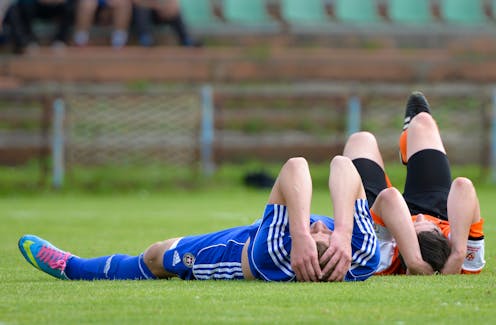Should I get my child a baseline concussion test before they start junior sports?
- Written by Sarah Hellewell, Research Fellow, Faculty of Health Sciences, Curtin University, and The Perron Institute for Neurological and Translational Science, Curtin University

Concussions can occur in many different ways, but they are more likely to occur[1] when playing fast-paced team sports like Australian football, rugby, netball, hockey and soccer.
Unlike many other injuries, recovery from concussion can look different for everyone.
Factors[2] like age, biological sex and medical history can mean some people take longer to recover from a concussion.
Because the effects of concussion can be subtle and symptoms vary day to day, it can be difficult to make assessments of recovery.
Research is also increasingly showing the brain is still healing[3] after “clinical recovery”, or the time by which concussion symptoms resolve.
For these reasons, objective tests can be helpful to understand brain recovery and guide decisions on returning to sport.
Which brings us to baseline concussion tests.
What is a baseline concussion test?
Baseline concussion tests[4] capture a snapshot of an athlete’s brain function at the beginning of a season of play.
When performed in children before commencing sport, baseline concussion assessments tell us what the child’s performance is like prior to any concussion or nonconcussive injuries[5].
These tests can be carried out in children as young as five.
The benefit of baseline testing is it allows us to compare brain functioning at different stages.
If a child is playing junior sports, a baseline assessment before the start of the season can be a useful tool – if the child sustains a concussion, repeating the same tests lets us compare post-concussion results to the baseline assessment.
If the results are similar, it suggests a child has recovered well. But any differences show there are problems with the way the brain is working that need further attention.
What is the process?
Baseline concussion tests can take several forms but most include tests of cognitive function[6]. These examine our ability to pay attention, plan actions, control our impulses, and retain memory in the short and longer term.
Tests can be performed with paper and pencil, on a computer or tablet, or a mix of both.
Other types of baseline concussion tests may assess balance, motor coordination and eye movement. Cognitive tests often take the form of games which can’t be easily remembered or memorised, making them suitable for repeated testing.
Baseline concussion tests are routinely used in many elite sports[7] to understand injury recovery.
This information can be used to determine whether a player is ready to return to the sports field.
A baseline concussion test can play a role in athletes’ brain health.For professional athletes, these tests can also be used to guide medical decisions about whether a player should retire[8] due to ongoing problems from past concussions.
In these cases, a player’s repeated tests after concussion may be persistently different from their baseline, indicating they are having trouble with some aspect of their thinking, planning or understanding, which may worsen if another concussion is sustained.
It is important to note that most children who experience concussion will recover well[9], and will not experience long-term symptoms from their injury.
For this reason, baseline testing is not necessary in all cases. However, it can be a worthwhile investment as an additional source of information which may be useful later on if a concussion is experienced.
A drawback of baseline concussion testing is it requires a professionally trained person to administer the tests and understand and interpret the results. This means they can be expensive and require appointments, which may be difficult to schedule.
When should testing be done?
For those who do want to pursue baseline concussion testing, parents should first find out whether they are offered by their sporting club or school, if playing school sports.
If not available in these contexts, these tests are offered by many physiotherapists and neuropsychologists.
Baseline tests should be conducted in the pre-season before commencing sport and should be repeated each year regardless of whether a concussion has occurred.
If a child is concussed during the sports season, concussion tests should be conducted at least a week or two after the injury, when symptoms have mostly or fully resolved.
Regardless of whether baseline concussion testing is performed or not, the best thing for concussion recovery is to immediately remove the child from the sports field[10] and keep them out of play until well after their concussion symptoms have resolved.
Following the Australian Concussion Guidelines for Youth and Community Sport[11] and returning to competitive sport a minimum of two weeks after symptoms have resolved will allow the brain proper time to heal and give children the best chance of a full recovery.
References
- ^ more likely to occur (edition.cnn.com)
- ^ Factors (www.tandfonline.com)
- ^ still healing (www.ncbi.nlm.nih.gov)
- ^ Baseline concussion tests (www.mayoclinic.org)
- ^ nonconcussive injuries (bjsm.bmj.com)
- ^ cognitive function (www.ncbi.nlm.nih.gov)
- ^ routinely used in many elite sports (www.dailytelegraph.com.au)
- ^ medical decisions about whether a player should retire (theconversation.com)
- ^ recover well (www.ncbi.nlm.nih.gov)
- ^ immediately remove the child from the sports field (www.concussioninsport.gov.au)
- ^ Australian Concussion Guidelines for Youth and Community Sport (www.concussioninsport.gov.au)
Authors: Sarah Hellewell, Research Fellow, Faculty of Health Sciences, Curtin University, and The Perron Institute for Neurological and Translational Science, Curtin University










